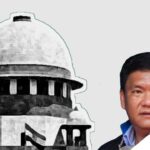Code:
(1) If, upon taking all the evidence referred to in section 244, the Magistrate considers, for reasons to be recorded, that no case against the accused has been made out which, if unrebutted, would warrant his conviction, the Magistrate shall discharge him.
(2) Nothing in this section shall be deemed to prevent a Magistrate from discharging the accused at any previous stage of the case if, for reasons to be recorded by such Magistrate, he considers the charge to be groundless.
STATE AMENDMENT
West Bengal
In section 245 of the principal Act, after sub-section (2), the following sub-section shall be inserted: —
“(3) If all the evidence referred to in section 244 are not produced in support of the prosecution within four years from the date of appearance of the accused, the Magistrate shall discharge the accused unless the prosecution satisfies the Magistrate that upon the evidence already produced and for special reasons there is ground for presuming that it shall not be in the interest of justice to discharge the accused.”.
[Vide West Bengal Act 24 of 1988, s. 5.]
Explanation:
This section empowers the Magistrate to discharge an accused if, after considering the evidence presented by the prosecution, the Magistrate finds that there is “no sufficient ground” to proceed with the trial. This means that the evidence presented is insufficient to establish a prima facie case against the accused. A prima facie case is a case that, on the face of it, appears to be true and sufficient to prove guilt.
Illustration:
Consider a case where a person is accused of theft. The prosecution presents evidence like witness statements and CCTV footage, but these are inconsistent and unreliable. The Magistrate, after examining the evidence, finds that it is not strong enough to establish a prima facie case against the accused. In this scenario, the Magistrate can discharge the accused under Section 245 CrPC.
Common Questions and Answers:
Q: Can the prosecution appeal against a discharge order?
A: Yes, the prosecution can appeal against a discharge order under Section 245 CrPC. The appeal can be filed before the higher court, which has the power to either uphold the discharge order or set it aside and order a trial.
Q: What is the difference between “discharge” and “acquittal”?
A: Discharge occurs before the trial begins, while acquittal happens after the trial is completed. Discharge means that the accused is released because there is insufficient evidence for a trial, whereas acquittal means that the accused is found not guilty after the trial has taken place.
Q: Can an accused be discharged in all types of criminal cases?
A: No, Section 245 CrPC does not apply to all criminal cases. This section is only applicable to cases where the Magistrate is the presiding officer and not to cases tried by Sessions Courts or High Courts.








